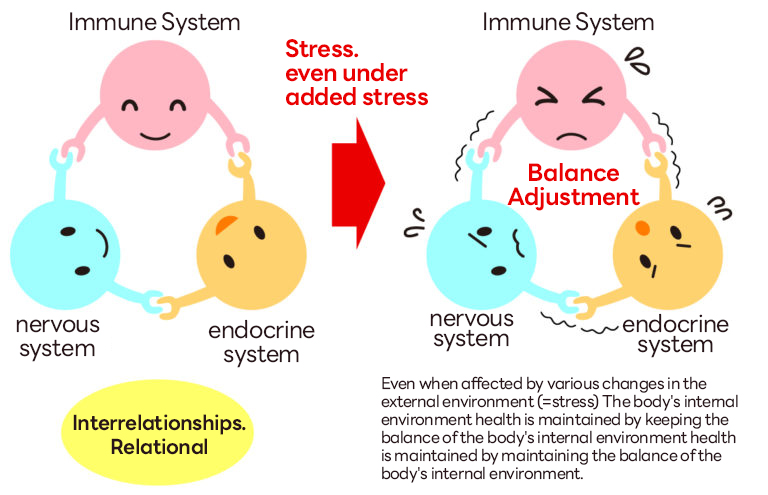How does the immune system work to support our health?
In recent years, research on immunity has progressed, the mechanisms of the immune system have been elucidated, and the “function of the immune system” to prevent disease and maintain health has been understood. In this issue, we will introduce how our immune system works in our bodies.

Eliminating pathogens and other foreign substances

There are countless pathogens such as viruses and bacteria around us. When these pathogens enter the body, the immune system plays an important role in protecting the body by judging them as foreign substances and attacking them. Immunity can be broadly divided into two types: “innate immunity,” which we have since birth, immediately attacks foreign substances such as pathogens when they enter our bodies, and “acquired immunity,” which protects us from foreign substances by attacking them when they enter our bodies. The other is “acquired immunity,” which remembers pathogens that once entered the body and effectively attacks them when they enter again. It is thanks to this acquired immunity that we are less susceptible to diseases that we have once contracted.
From old cells to new cells

The human body continuously regenerates new cells from old cells that have been infected by pathogens or have aged. The human body consists of about 37 trillion cells, of which about 2% are renewed every day. It is said that 3,000 to 5,000 cancer cells are generated every day due to errors in the process of “cell division. Immune cells monitor the body and try to protect us by attacking cancer cells that have been generated in the body at an early stage.
Enhancing natural healing power and leading the body to recovery

By enhancing the immune system, natural healing power is increased, which can stop the progression of disease and help the body recover. Diet is an important factor in enhancing the body’s natural healing power. Antioxidants such as vitamin C, vitamin E, polyphenols, and β-carotene help keep the blood clean and improve the flow of blood. In addition, eating “high-quality protein” that contains amino acids in good balance improves metabolism and immunity because it is a material for muscles, organs, and hormones that help regulate the body.
Regulating the balance of the autonomic nervous system and hormones

Immunity is deeply related to the autonomic nervous system (sympathetic nerves and parasympathetic nerves) and the endocrine system (hormones), and they interact with each other by exchanging information. The autonomic nervous system regulates vital functions such as digestion, respiration, body temperature, blood pressure, and excretion. The endocrine system refers to the various hormones, which are substances that regulate the body’s condition and have many types and effects. The balance between these three plays an important role in maintaining normal immune function.
Conclusion
Immunity is an important function essential for maintaining our health. To enhance immunity, it is essential to lead a regular life with a well-balanced diet, moderate exercise, and good sleep. Let’s live a healthy life by being conscious of the lifestyle that enhances immunity on a daily basis.


